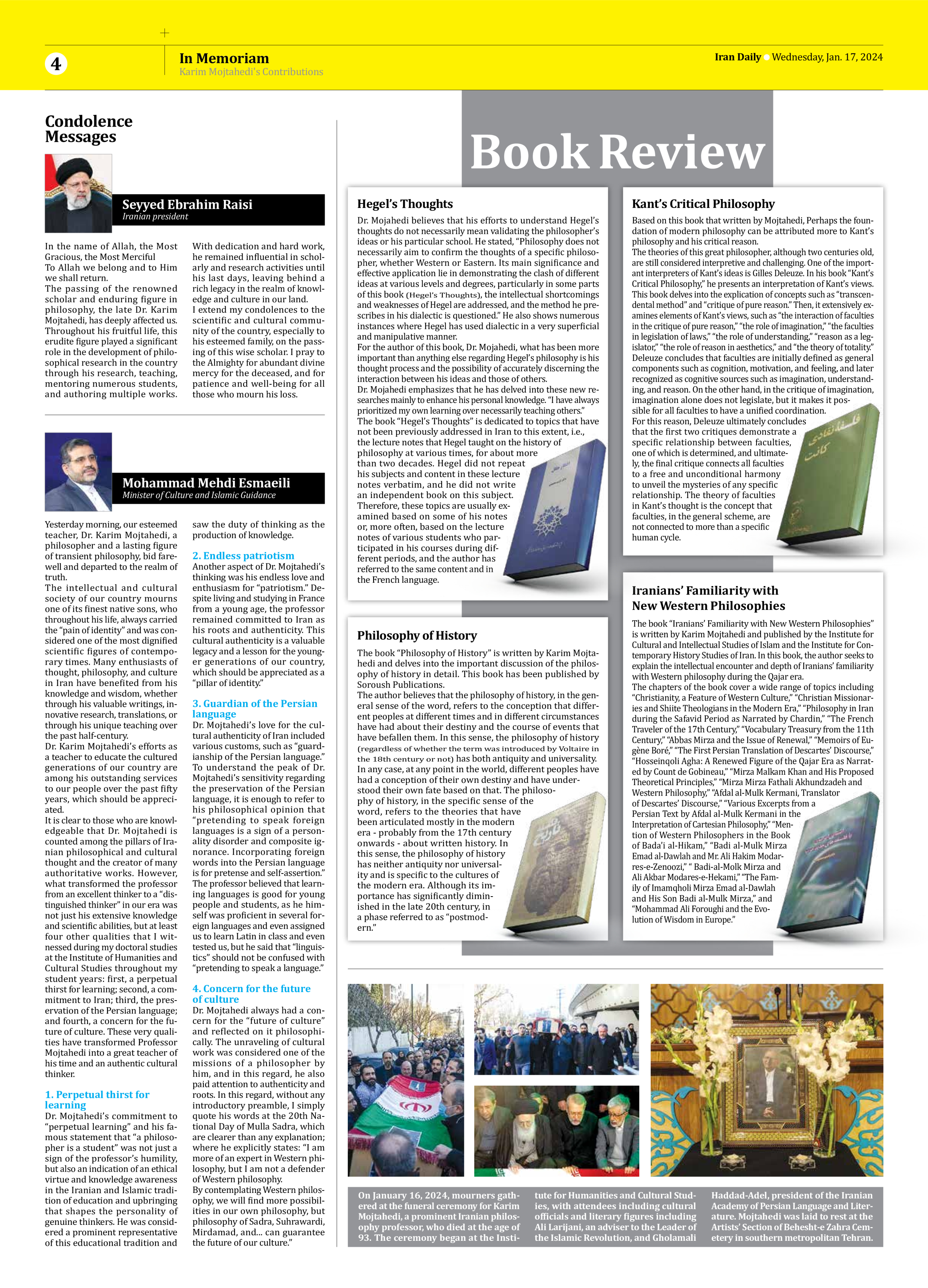
Book Review
Hegel’s Thoughts
Dr. Mojahedi believes that his efforts to understand Hegel’s thoughts do not necessarily mean validating the philosopher’s ideas or his particular school. He stated, “Philosophy does not necessarily aim to confirm the thoughts of a specific philosopher, whether Western or Eastern. Its main significance and effective application lie in demonstrating the clash of different ideas at various levels and degrees, particularly in some parts of this book (Hegel’s Thoughts), the intellectual shortcomings and weaknesses of Hegel are addressed, and the method he prescribes in his dialectic is questioned.” He also shows numerous instances where Hegel has used dialectic in a very superficial and manipulative manner.
For the author of this book, Dr. Mojahedi, what has been more important than anything else regarding Hegel’s philosophy is his thought process and the possibility of accurately discerning the interaction between his ideas and those of others.
Dr. Mojahedi emphasizes that he has delved into these new researches mainly to enhance his personal knowledge. “I have always prioritized my own learning over necessarily teaching others.”
The book “Hegel’s Thoughts” is dedicated to topics that have not been previously addressed in Iran to this extent, i.e., the lecture notes that Hegel taught on the history of philosophy at various times, for about more than two decades. Hegel did not repeat his subjects and content in these lecture notes verbatim, and he did not write an independent book on this subject. Therefore, these topics are usually examined based on some of his notes or, more often, based on the lecture notes of various students who participated in his courses during different periods, and the author has referred to the same content and in the French language.
Kant’s Critical Philosophy
Based on this book that written by Mojtahedi, Perhaps the foundation of modern philosophy can be attributed more to Kant’s philosophy and his critical reason.
The theories of this great philosopher, although two centuries old, are still considered interpretive and challenging. One of the important interpreters of Kant’s ideas is Gilles Deleuze. In his book “Kant’s Critical Philosophy,” he presents an interpretation of Kant’s views. This book delves into the explication of concepts such as “transcendental method” and “critique of pure reason.” Then, it extensively examines elements of Kant’s views, such as “the interaction of faculties in the critique of pure reason,” “the role of imagination,” “the faculties in legislation of laws,” “the role of understanding,” “reason as a legislator,” “the role of reason in aesthetics,” and “the theory of totality.”
Deleuze concludes that faculties are initially defined as general components such as cognition, motivation, and feeling, and later recognized as cognitive sources such as imagination, understanding, and reason. On the other hand, in the critique of imagination, imagination alone does not legislate, but it makes it possible for all faculties to have a unified coordination. For this reason, Deleuze ultimately concludes that the first two critiques demonstrate a specific relationship between faculties, one of which is determined, and ultimately, the final critique connects all faculties to a free and unconditional harmony to unveil the mysteries of any specific relationship. The theory of faculties in Kant’s thought is the concept that faculties, in the general scheme, are not connected to more than a specific human cycle.
Philosophy of History
The book “Philosophy of History” is written by Karim Mojtahedi and delves into the important discussion of the philosophy of history in detail. This book has been published by Soroush Publications.
The author believes that the philosophy of history, in the general sense of the word, refers to the conception that different peoples at different times and in different circumstances have had about their destiny and the course of events that have befallen them. In this sense, the philosophy of history (regardless of whether the term was introduced by Voltaire in the 18th century or not) has both antiquity and universality.
In any case, at any point in the world, different peoples have had a conception of their own destiny and have understood their own fate based on that. The philosophy of history, in the specific sense of the word, refers to the theories that have been articulated mostly in the modern era - probably from the 17th century onwards - about written history. In this sense, the philosophy of history has neither antiquity nor universality and is specific to the cultures of the modern era. Although its importance has significantly diminished in the late 20th century, in a phase referred to as “postmodern.”
Iranians’ Familiarity with
New Western Philosophies
The book “Iranians’ Familiarity with New Western Philosophies” is written by Karim Mojtahedi and published by the Institute for Cultural and Intellectual Studies of Islam and the Institute for Contemporary History Studies of Iran. In this book, the author seeks to explain the intellectual encounter and depth of Iranians’ familiarity with Western philosophy during the Qajar era.
The chapters of the book cover a wide range of topics including “Christianity, a Feature of Western Culture,” “Christian Missionaries and Shiite Theologians in the Modern Era,” “Philosophy in Iran during the Safavid Period as Narrated by Chardin,” “The French Traveler of the 17th Century,” “Vocabulary Treasury from the 11th Century,” “Abbas Mirza and the Issue of Renewal,” “Memoirs of Eugène Boré,” “The First Persian Translation of Descartes’ Discourse,” “Hosseinqoli Agha: A Renewed Figure of the Qajar Era as Narrated by Count de Gobineau,” “Mirza Malkam Khan and His Proposed Theoretical Principles,” “Mirza Mirza Fathali Akhundzadeh and Western Philosophy,” “Afdal al-Mulk Kermani, Translator of Descartes’ Discourse,” “Various Excerpts from a Persian Text by Afdal al-Mulk Kermani in the Interpretation of Cartesian Philosophy,” “Mention of Western Philosophers in the Book of Bada’i al-Hikam,” “Badi al-Mulk Mirza Emad al-Dawlah and Mr. Ali Hakim Modarres-e-Zenoozi,” “ Badi-al-Molk Mirza and Ali Akbar Modares-e-Hekami,” “The Family of Imamqholi Mirza Emad al-Dawlah and His Son Badi al-Mulk Mirza,” and “Mohammad Ali Foroughi and the Evolution of Wisdom in Europe.”






